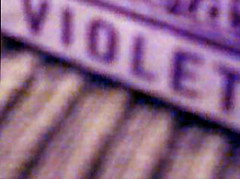Newitz, Annalee. Pretend We're Dead: Capitalist Monsters in American Pop Culture. Durham and London: Duke University Press, 2006.
If y'all haven't noticed, Annalee Newitz is one of my favorite internet commentators, both because I enjoy the topics she chooses and because she seems like a super-cool person. Plus, I love that she survived the academia madness and walked away to become a freelance writer. My first exposure to her was reading selections from this book in a grad class and I moved on to become a regular reader of her AlterNet column. So when Pretend We're Dead, a book based on her dissertation, was released, I knew I had to read it right away.
My first reaction to the book is that it's fabulously readable for academic nonfiction. I honestly read it straight through in about two days and I sort of felt like this. While it's incredibly intelligent with fabulous readings of many movies from the familiar to the obscure, the book is not nearly as obtuse as most books based on dissertations. Pretend We're Dead can really appeal to the non-academic reader who just loves monster movies or media studies and would appreciate a brilliant new reading of several of them.
While the premise that monster stories (this book analyzes both novels and movies) reveal a lot about the culture that produces them is hardly revolutionary, Newitz's analysis is clear and convincing in discussing the ways in which certain genres address the anxieties generated by capitalism. She does indeed have a point that a lot of the academic film criticism in general, not to mention that focused on monster genres (horror, sci-fi, trillers, true crime, etc), deals more with psychoanalysis and feminism than economics or other forms of social commentary that may be relevant to interpretation of the films. The real strength of this book is the concise, coherent readings of books and films that Newitz performs. Up until the fourth chapter, on robots, almost none of the objects of Newitz's analysis were texts I had read or seen, and yet I was fascinated and convinced by her argument partially because I got such a clear sense of the plots and major ideas, and yet she never belabored her analysis with excessive plot description. She similarly deals elegantly with dense and complicated critical theory, citing Marx, Lukács, Marcuse, Huyssen, and Horkeimer in a way that doesn't bog the book down for the general reader.
I was particularly intrigued by the chapter on mad scientists ("Mad Doctors: Professional Middle-Class Jobs Make You Lose Your Mind"), which argues that intellectual labor alienates the doctor or scientist (or any academic) from their own brain as the site of production. This was the second chapter, and I felt the book only grew more compelling as it progressed. I honestly wished that the final chaper, "Mass Media: Monsters of the Culture Industry," were a book of its own, and I would love to see Newitz continue writing on that particular topic. In fact, the whole book left me wanting more. I may not have agreed with everything Newitz said, and if I were approaching the same topic I certainly would have done it differently, but in general my major complaint is that I wanted the book to go even further and deeper. I honestly wanted to continue the conversation after I had finished the book, and I wish I had friends who had read the book with whom I could discuss my thoughts more thoroughly. It's an extremely compelling book, and I recommend it to anyone even mildly interested in media and pop culture studies.
Zin Galactic cut
-
Zin Galactic cut
Sometimes there's something I like but I have to cut it because of how the
play functions better without it. I just cut this from Zin Gal...
1 day ago

0 comments:
Post a Comment